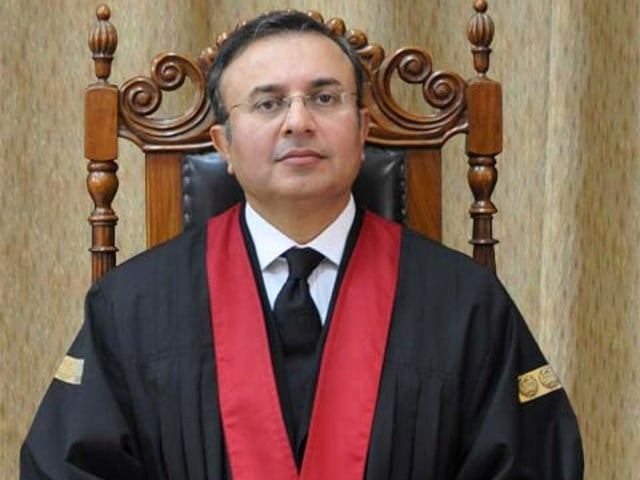‘Pendency in cases biggest challenge to criminal system’
SC's Justice Shah emphasises need to reduce delays, expedite court procedures, strengthen alternate dispute mechanisms

Justice Syed Mansoor Ali Shah of the Supreme Court has identified delays in the disposal of cases as the biggest challenge facing the criminal justice system, regretting that the pendency in cases devastates families and litigants.
Justice Shah expressed these views at the final edition of the Technology for Justice Forum (T4JF) 2022, held in Islamabad. He attended the event as the keynote speaker.
The judge emphasised the need to transform the way the hearings of the cases were conducted through technology to deal with over 2.2 million cases pending before the courts.
“We need to reduce delays, expedite court procedures and strengthen alternate dispute mechanisms.”
Read more: 53,547 cases pending before Supreme Court
Commenting on the procedural delays caused by the manual system Justice Mansoor Ali Shah said: “We have to reduce the shelf life of cases to one year by strengthening the alternative dispute resolution mechanisms, introducing online hearing arrangements and establishing proactive data-based monitoring systems. We need to improve our case management systems to prioritise human rights cases and cases related to women, children and prisoners.”
The conference was aimed at promoting tech-based solutions to reform Pakistan’s justice system.
This forum brought together government stakeholders, legal practitioners and entrepreneurs to showcase ground-breaking innovations holding the potential to revolutionise dispensation and access to justice in Pakistan. The closing remarks at the conference were given by Chief Justice Islamabad High Court (IHC) Justice Athar Minallah.
Chief Justice Islamabad High Court, Justice Athar Minallah concluded the conference by stressed on the need for a “movement towards reimagining the justice system according to the technological requirements of the 21st century”.
Also read: Number of pending cases in Supreme Court nears 49,000
Commenting on the initiatives taken by the IHC, Chief Justice Minallah added, ‘Islamabad High Court was the first court to introduce e-court proceedings during Covid-19, and upload all interim court orders on its website.’
In attendance were some of the most prominent personalities from the legal fraternity including Omar Soomro - Secretary of the Sindh High Court Bar Association, Shoaib Shaheen - President of the Islamabad High Court Bar Association, Munizae Jahangir - Board Member of the Asma Jahangir Legal Aid Cell and Muhammad Ahmad Pansota - Sr. Legal Analyst and Partner at Ahmad and Pansota.
“Going forward, technology is becoming more relevant in all walks of life especially when it comes to the legal field and access to justice," Bernhard Schlagheck, Germany’s ambassador to Pakistan, said.
T4JF was founded in 2019 with a vision to provide indigenous solutions for the problems plaguing the justice system of Pakistan such as clearing the backlog of over 2.1 million cases, digitizing court records, and developing mobile applications for litigants to gain easy access to justice and building a thriving community of lawyers. Two editions of the conference were held earlier this year in Lahore and Karachi.
“This final edition of T4JF 2022, is a culmination of this year’s journey proving the potential of legal tech in Pakistan. The forum's central aim is an improved human rights regime, greater transparency, accountability, and efficiency in the legal system. Introducing technology into the legal system means that we are empowering the people of Pakistan. Our dream is to make every Pakistani a part of this digital legal Pakistan with justice in the palm of their hands,” said Isfundiar Kasuri, Co-Founder Vakeel Online.



















COMMENTS
Comments are moderated and generally will be posted if they are on-topic and not abusive.
For more information, please see our Comments FAQ